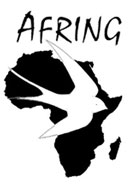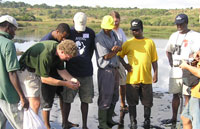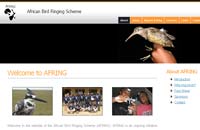AFRING: Connecting ringers in Africa and around the world
 Over
Over
three decades have passed since the concept of AFRING
- an African bird ringing scheme, was raised. Experts
agreed that gaps in the knowledge of bird population dynamics,
movements and migration in Africa limited the ability to
implement effective science-backed conservation action,
and that a coordinated approach was necessary to fill these
gaps. However, limited trained personnel and lack of funding
prevented the formalization of a continent-wide coordinated
scheme but the concept never died.
Already in 1999 at its first meeting,
the Parties to the African-Eurasian Migratory Waterbird
Agreement (AEWA)
recognized the importance of developing an African ringing
scheme and identified it as one of their priority projects,
and with start-up funding from AEWA, AFRING was born in
January 2004. Two further project phases were funded by
the AEWA Secretariat through voluntary contributions form
the EU.
 Based
Based
at the Animal Demography Unit (ADU)
at the University of Cape Town, the focus of AFRING was
initially on waterbirds but this is now shifting to include
all African bird species. Activities have focused on training
and awareness raising, and creating an information technology
platform.
Over the past five years, AFRING and its
partners have conducted four training workshops in Kenya,
Ghana, South Africa and Zambia, trained almost 50 African
ringers, established a centralized database system for African
ringing data and set policies for the future of the organization.
With a foundation now laid, AFRING is
well set to further strengthen the bird ringing and conservation
networks within Africa and around the world. New programmes,
initiatives and projects will be developed into the future
to continue carrying the message of the important role that
bird ringing plays in bird and biodiversity conservation.
 One
One
such initiative is the establishment of the AFRING website
(www.afring.org)
which aims to provide an improved source of information
and resources to the African and global ringing community.
One of the main features of the site, which was developed
during the third project phase in 2008, is that it provides
an efficient mechanism to report a recovered ring on-line,
an important aspect in an African context and for subsequent
data analyses.
Information about ringing courses, research
opportunities and links to other related sites are also
featured and the site will continue to be updated and improved
on a regular basis.
To learn more about AFRING please visit:
www.afring.org
Dernière mise à jour le 16 Juin 2014


